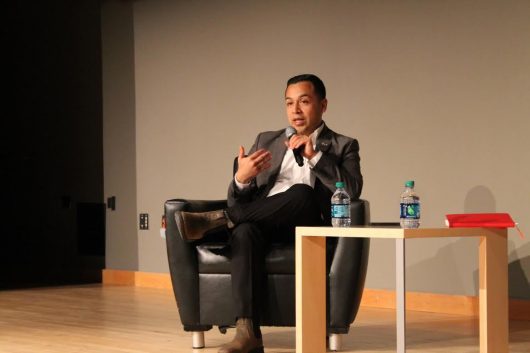
Cesar Vargas was the first openly undocumented lawyer to be licensed in New York and has become a well-known immigration advocate on Capitol Hill and nationwide. Credit: Akayla Gardner
In a two-part event entitled “Exploring DACA: One Man’s Journey,” the Student Life Multicultural Center hosted immigration attorney Cesar Vargas on Monday night to discuss implications of the termination of the Deferred Action for Childhood Arrivals program under President Donald Trump’s administration.
As the first openly undocumented lawyer to be licensed in New York, Vargas has become a well-known immigration advocate on Capitol Hill and nationwide.
He was involved in the creation of DACA — a 2012 Obama-era directive — which seeks to protect children brought to America illegally from deportation. Vargas also worked as an adviser for Sen. Bernie Sanders’ presidential campaign.
Vargas’ presentation delved into the question still facing many undocumented college students today: What does the future hold for DACA recipients?
Vargas said every day 122 DACA recipients, also known as “Dreamers,” are losing protection. He estimated that taking away DACA will cost the U.S. economy $463.3 billion because 90 percent of program recipients are working and pay their taxes.
“DACA was a significant victory, but what the reality was, the difference between a legislative proposal and an executive program, was that it could be undone in a second,” Vargas said.
When the Trump administration announced in September it would be rescinding DACA, reports also surfaced detailing Trump’s negotiations with Democrats Sen. Chuck Schumer and House Minority Leader Nancy Pelosi focusing on creating a policy that would provide a pathway to citizenship for eligible DACA recipients in exchange for billions to go toward funding border security.
“Prospects for an agreement have had its highs and lows, depending on who whispers first and last in the president’s ear,” Vargas said. He said Trump’s immigration adviser Stephen Miller and Attorney General Jeff Sessions have the harshest opinions toward immigration.
“These are people who truly have targeted not just undocumented immigrants, but also legal immigrants,” he said. “And frankly, we are seeing a repeat of the central component of what our immigration has always been based on: racial discrimination — period.”
Trump’s election was a moment of uncertainty for immigrants because his campaign was often characterized by discriminatory rhetoric, especially toward Mexicans, Vargas said, adding that rhetoric has carried into his presidency.
In January, Trump reportedly called some African and Caribbean nations “shithole countries.”
Despite his actions, Vargas believes Trump truly wants to work with Democrats to form a resolution that benefits immigrants, noting that Trump has met with “Dreamers” before.
“I do think that Donald Trump himself — as a person who grew [up] in Queens, New York, in one of the most diverse places in the world — understands that he wants to get immigration reform done.” Vargas said. “But a president who has never experienced politics … has eventually been washed by the anti-immigrant forces in Congress at this moment.”
As Thursday’s deadline for Congress to pass a bill funding the government approaches, there is still no clear consensus on immigration reform and many other legislative proposals. Of the immigration proposals circulating, Vargas said Congress will likely renew DACA for another year.
The audience included Ohio State DACA recipients, some of whom approached the microphone with questions for Vargas; several were noticeably emotional.
“The uncertainty that I feel as a DACA recipient and a future undocumented student feels — it is inhumane,” said Jessica Camacho, a third-year in social work. “I know I have until April 2019 on my status before it expires. I am supposed to graduate from the Ohio State University on May 2019. That’s 33 days [until the April expiration]. Thirty-three days that I don’t know if I will be able to graduate or not. The uncertainty that I feel is immense.”
Vargas, a co-founder of the Dream Act Coalition, said the U.S. is built on immigrants and he continues to have hope that Congress will make the American dream available to everyone.
“I’m 100 percent Mexican, but I’m also 100 percent American and only in this country can I truly say that,” Vargas said.

![The Lantern reached out to Ohio State students to hear their opinions on the outcome of the presidential election and what issues most influenced their vote. Credit: Win McNamee/Getty Images via TNS [Original caption: Republican presidential nominee, former U.S. President Donald Trump and Democratic presidential nominee, U.S. Vice President Kamala Harris greet as they debate for the first time during the presidential election campaign at The National Constitution Center on Sept. 10, 2024 in Philadelphia, Pennsylvania.]](https://www.thelantern.com/files/2024/10/US-NEWS-CAMPAIGN-LATINOS-GET-384x253.jpeg)
